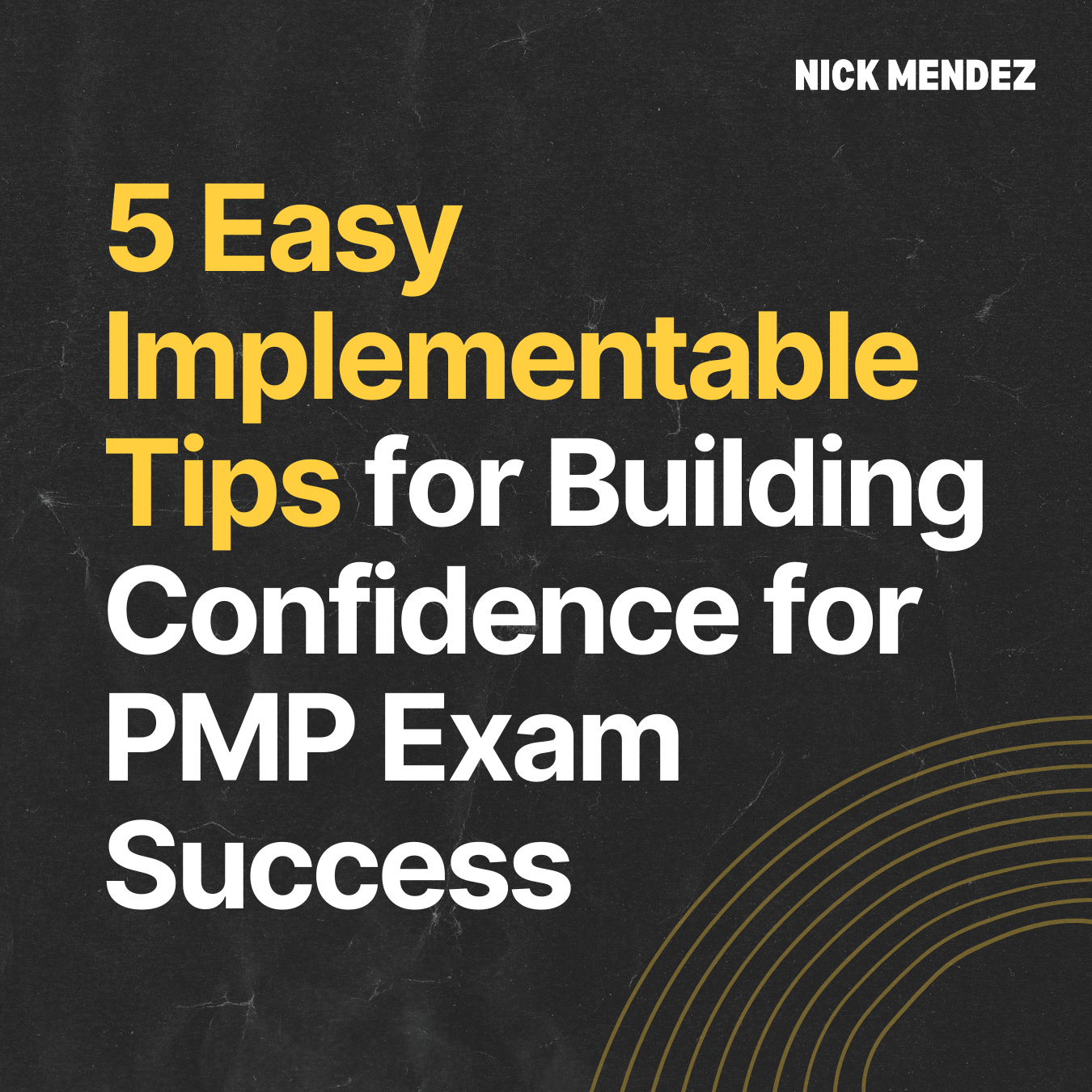5 Easy Implementable Tips for Building Confidence for PMP Exam Success
Table of Contents

About the Author – About Nicholas Mendez (Nick Mendez):
Nicholas Mendez (Nick Mendez) is a 25-year-old tech professional with 5+ years of project management experience. He earned his PMP certification on April 30, 2023, marking a significant milestone in his career. Since then, he’s written many guest posts and blog posts where readers have received a great amount of value and knowledge to prepare for their PMP exam. Check out his FREE exclusive top-notch PMP study resources at teachmeit.co and nickmendez.co and get ready to take your career to the next level!

On the path toward PMP certification, it’s essential to acknowledge the formidable challenge that lies before us—the Project Management Professional (PMP) exam. Administered by the Project Management Institute (PMI), this assessment rigorously tests our knowledge, skills, and capabilities in project management. However, among all the materials and study methods, one thing that’s often overlooked but crucial for exam success is confidence. Confidence is like the glue that holds everything together, affecting how we study, make decisions, and ultimately perform on the exam.
In this guide, we will explore five practical strategies crafted to increase confidence for PMP exam success. These actionable tips, grounded in efficacy, are tailored to empower you to navigate the exam with assurance and determination. Let us embark on this journey toward certification excellence together.
1. Review Practice Answers You Got Wrong
When preparing for the PMP exam, it’s crucial to learn from your mistakes.
I’ve spoken to hundreds of people who have passed the PMP. One recurring theme I’ve encountered is those who are successful on the exam have continuously not only studied but also constantly reviewed answers they’ve gotten wrong on practice exams, tests, and quizzes. Seeking to understand the concepts and knowledge behind WHY you got an answer wrong will take you far.
Here’s a simple approach to make the most of reviewing practice questions you answered incorrectly:
- Understand Mistakes: Take time to understand why you got certain practice questions wrong. Was it a misunderstanding of a concept, a misinterpretation of the question, or simply a careless error?
- Look For Patterns: Look for recurring themes or types of questions where you tend to make mistakes. This can help you focus your study efforts on areas that need improvement. Especially be on the lookout for what domains of the exam you’re repeatedly struggling with so you can study those more in-depth.
- Corrective Action: Once you’ve identified your mistakes, take proactive steps to address them. This could involve revisiting relevant study materials, learning about a domain of the exam more in-depth, seeking clarification, or practicing similar questions to reinforce your understanding.
By actively reviewing and learning from your mistakes, you’ll not only improve your understanding of project management concepts but also boost your confidence for the PMP exam.
2. Use Logic Instead of Memorization
When you’re getting ready for the PMP exam, it’s better to understand the concepts of project management rather than just memorize facts. Instead of trying to remember everything exactly, take the time to really grasp what the concepts mean. This not only helps you remember things better but also makes it easier to think clearly during the test. Using common sense and logical thinking is key for doing well on the exam. Instead of solely relying on memory, take a moment to analyze the situation. This can help you figure out the best way to solve a problem or make a decision.
Having strong problem-solving skills is also crucial for success on the PMP exam. By practicing how to solve different kinds of problems, you’ll feel more confident when you encounter them during the test. So, focus on understanding, thinking logically, and practicing problem-solving to do your best on the exam. With these strategies, you’ll be better prepared to tackle the challenges of the PMP exam and demonstrate your proficiency in project management.
3. Focus on Improving Weaknesses to Boost Confidence for PMP Exam
When gearing up for the PMP exam, addressing weaknesses is crucial for comprehensive preparation. Begin by scrutinizing your project management knowledge and skills, and pinpointing areas where improvement is needed. This might entail identifying challenges in communication or gaps in problem-solving abilities. Once weaknesses are identified, allocate study time strategically, prioritizing these areas for intensive review.
While leveraging strengths is important, dedicating extra effort to bolster weak spots is equally essential. Neglecting weaknesses can leave critical gaps in understanding, potentially impacting exam performance. By investing time and energy into shoring up areas of weakness, you not only enhance your overall proficiency but also mitigate potential obstacles on exam day. Facing down your weaknesses also makes you feel more prepared and confident, which will enable you to handle any obstacles that may come up during the test. So, embrace the opportunity to improve your weaknesses, and approach the PMP exam with a well-rounded foundation for success.
4. Tame The Chatter In Your Brain
We all have thoughts about what we’re doing on the weekend, what we’re eating that night, or what our friends, family, or significant other are up to. Unfortunately, thoughts like these are very distracting and can take you away from your best when both PMP studying and on the big day of your PMP exam.
Taming the chatter in your brain is critical for success in preparing for the PMP exam. My advice is to start by practicing mindfulness techniques to manage the stress and anxiety that often come with exam preparation. Taking moments to breathe deeply, focus on the present, and acknowledge any distracting thoughts can help calm your mind and improve your overall well-being. Using relaxation techniques like progressive muscle relaxation or visualization can also assist you in staying composed and focused throughout the exam. By incorporating these techniques into your routine, you can better manage any nervousness or jitters that may arise, allowing you to approach the exam with a clear and composed mindset.
Developing a resilient mindset is also essential if you want to overcome obstacles and disappointments that come up during your PMP journey. Acknowledge that setbacks are a natural part of the learning process and an opportunity for growth. By maintaining a positive attitude and staying resilient in the face of obstacles, you can persevere through difficult times and continue moving forward toward your goal of securing a PMP certification. Remember to celebrate your successes along the way and keep sight of the progress you’ve made. With a resilient mindset, you’ll be better equipped to navigate the ups and downs of the PMP journey and emerge stronger and more confident in your abilities.
5. Believe in Yourself – You’ve Got This!
Believing in yourself is essential as you prepare for the PMP exam. Begin building self-confidence by recognizing your past accomplishments and successes in project management. Reflecting on your accomplishments can remind you of your capabilities and strengths, boosting your confidence as you approach the exam. Visionary success in earning the PMP certification and growing your project management career is also important. Picture yourself passing the exam with flying colors and envision the doors of opportunity that will open for you with this achievement. By visualizing success, you can fuel your motivation and reinforce your belief in your ability to reach your goals.
Trust in your abilities and preparation efforts as you navigate the PMP exam journey. Remind yourself that you have put in the hard work and dedication necessary to succeed. Trust that you have the knowledge and skills required to excel in the exam, and have confidence in your ability to perform well under pressure. By maintaining a positive mindset and trusting in yourself, you can approach the exam with a sense of calm and assurance. Remember that self-belief is a powerful tool that can propel you toward success, both in the PMP exam and in your career as a project manager. With enough study and dedication, you will pass!
Recap
In summary, building confidence for PMP exam success involves several key strategies. To improve your comprehension, it is important to first review practice answers that you misunderstood and mark mistakes. Second, use critical thinking abilities to evaluate project scenarios effectively and give logic precedence over memorization. Next, identify and play to your strengths, allocating study time strategically and leveraging your strong areas. It’s also important to tame the chatter in your brain by practicing mindfulness techniques and maintaining focus during the exam. Lastly, believe in yourself by acknowledging past achievements, visualizing success, and trusting in your abilities and preparation efforts.
As you implement these strategies, remember to stay focused and determined. Consistent effort and dedication will lead to progress and success. Keep pushing forward, even in the face of challenges or setbacks. Ultimately, believing in yourself and staying determined are crucial factors in achieving your goal of PMP exam success. Keep the faith, stay committed, and you’ll be well on your way to reaching your aspirations in project management.
